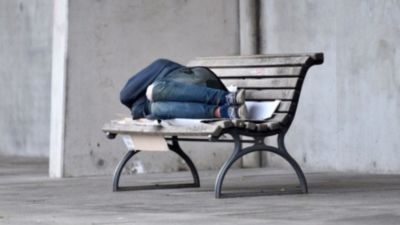Report finds £210m public money 'wasted' reacting to - not solving - rough sleeping in Wales

A report has accused the public sector of "wasting" up to £210m reacting to rough sleeping, rather than preventing it.
It revealed that many of those being helped off the streets are not getting the support needed to keep them from going back.
During the coronavirus pandemic, the Welsh Government made £30m available to tackle rough sleeping. Charities have been campaigning for resources like these for years.
Some of the money was used by councils to secure empty student accommodation, hotel rooms and B&Bs for use by rough sleepers.
The Auditor General for Wales, appointed by the Queen to inspect how public money is spent in Wales, said the response to homelessness during the crisis should act as a catalyst for change.
"There has been a real change and emphasis on rough sleeping since the pandemic hit, with public services stepping up to help people off the streets into accommodation," Auditor General Adrian Crompton said.
"Public services now need to capitalise on this work and deliver longer-term solutions to end people sleeping on our streets."
How many people are sleeping rough in Wales?
The true number of people sleeping rough in Wales is unknown, but the estimations show the number is rising.
The most recent annual count undertaken in October and November 2019 found approximately 405 people were sleeping rough.
Specialist charities who work with people sleeping rough estimate there to be roughly 3,000 accounts of rough sleeping in Wales every year.
Why do people sleep rough?
There are numerous reasons that lead to someone sleeping on the streets.
Some of the common factors include relationship breakdowns, poverty, unemployment, mental health problems, drug or alcohol misuse, sexual or physical abuse, leading to the inability to cope in independent housing.
The report said the more complex needs someone has and more trauma they have experienced, the more help they will need staying off the streets.
What can be done to prevent rough sleeping?
The report said many public bodies, including councils, the police, health bodies and housing associations, need to change how they work in order to improve accommodation and support services.
It advises they deliver a "single public service response" for those sleeping rough.
Mr Crompton added: "Public bodies must not just focus on giving people a roof over their head, it needs all partners to work together to address the root causes of homelessness.”
The Chair of the Senedd’s Equality, Local Government and Communities Committee echoed calls for public services to capitalise on their response to the crisis.
John Griffiths MS, said: "We have taken evidence and produced detailed reports with recommendations to tackle the issues involved.
"We also heard about the monumental effort being made by all partners, within local authorities and the third sector to get people off the streets at the height of the pandemic.
"What has been achieved is significant and impressive, and we hope that this can be built upon to meet the Welsh Government’s aim of making homelessness rare, brief and unrepeated."
The Welsh Government said more than 2,400 people were given access to accommodation to keep them safe during the pandemic.
"This has provided a unique opportunity to take a significant step towards our ambition of ending homelessness in Wales," a spokesperson added.
“We have been clear that no one should be forced to return to the streets, and we have pledged up to £40m this financial year to deliver a step change in homelessness services in Wales.
"This investment will provide much needed high quality temporary, interim and permanent accommodation options."